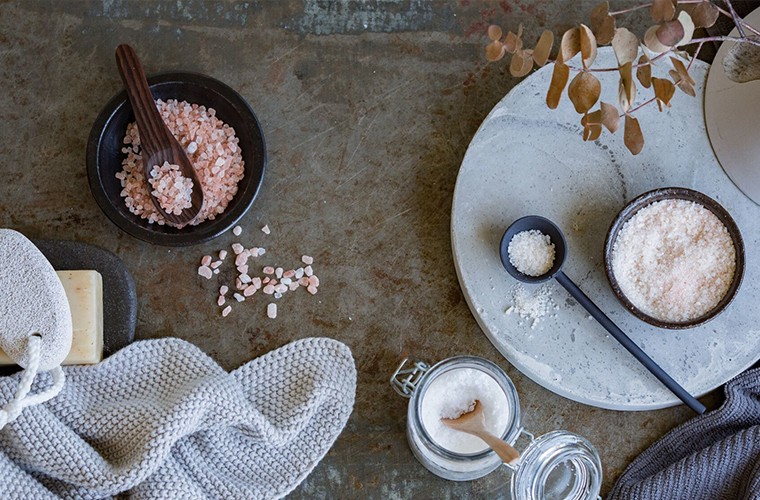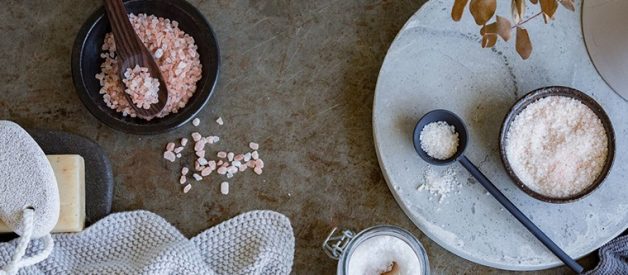Natural salts and minerals have been used for thousands of years in for medicinal, beautification and natural healing purposes. And while it all may seem like one and the same, there are some distinct differences between the many kinds of natural salts. Two of the most lauded are Dead Seas salts and Epsom salts.
We use them in medicine to treat a range of ailments, in our baths to soothe and soak away aches and pains, and when mixed with essential oils they become a refreshing natural addition to our beauty regime.
Read more about bath salts here.

Each salt has been used for hundreds of years to varying degrees in both health and beauty and although their origins are from opposite sides of the world, their properties cross paths time and time again. Here is everything you need to know about Epsom salts and Dead Sea Salts.
What Are The Differences Between Epsom Salts and Dead Sea Salts?
Epsom Salts
Epsom Salts and Dead Sea Salts are two go-tos for those seeking natural healing therapies. But what is the difference between the two? Much to people?s surprise, Epsom salts are not in fact salts. They are actually a mineral found in water containing high levels of magnesium and sulfate. When crystallised, it forms the substance we know now as Epsom salts.
Technically known as magnesium sulphate, Epsom salts don?t contain sodium chloride, which is the active ingredient in salt. We call it ?salt? due to its crystalline structure and properties that mirror actual salt. Regardless of its chemical makeup, Epsom salt is still hugely beneficial to our health. First distilled in Surrey England in the 1800s, the mineral is now used primarily in healing muscle injuries and for warm baths for relaxation and recovery. Today, much of the Epsom Salt sold has been manufactured, but you can find Epsom Salt that is sourced naturally and sustainably in Germany and USA.
Dead Sea Salt
Dead Sea salt, on the other hand, is a legitimate sea salt. Nestled between Jordan, Israel, and Palestine, the Dead Sea is a giant salt lake that formed more than fifteen million years ago. Its salt has been harvested for thousands of years and used in medicine and natural beauty remedies, and more recently in cooking. Its crumbling moist consistency sets it apart from the clear smooth crystals of Epsom salts.
The composition is also different. In regular ocean water, 85 percent of the salt is sodium chloride (table salt); however, Dead Sea salt is only 12?18 percent sodium chloride. This means that Dead Sea salt contains a richer mixture of other nutrients, primarily magnesium salts. In Dead Sea salts you will find 21 minerals which include magnesium, calcium, sulfur, bromide, iodine, sodium, zinc and potassium.
Beautifully absorbent, its high moisture content make it perfect for combining with natural essential oils. But this means Dead Sea Salts needs to be stored tightly and kept in a cool dry place, whereas Epsom salts are very resilient and can be stored in your bathroom cupboard.
Do Epsom Salts and Dead Sea Salts Work Differently? How Can I Use Them?
Epsom Salts
Epsom salts work slightly differently to Dead Sea Salts. Where the latter are more versatile in their uses when it comes to natural healing and beautification, Epsom salts have a key function in soothing muscles and aiding recovery from sporting injuries, swollen joints, and aches and pains.
When a few cups are added to your bath ? or a smaller amount added to a moist towel ? and applied to the affected area, the high levels of magnesium infused into the bloodstream and releases tension in our muscles and aides in recovery and repair. Perfect for after a big gym session, a long day of work or a sprain or strain inflicted on the football field. Add a couple of drops of your favourite essential oil and let your epsom salt bath become a place of relaxation and tranquillity.
Dead Sea Salt
Dead Sea Salts on the other hand have properties which are better utilised in beautification and detoxification. One way Dead Sea Salts can be used is to add them to a balm or oil and exfoliate problem areas. Whether that be dry skin, small bumps or cellulite, the high sulphate levels of these natural salts can detoxify, while the grainy texture can shift blemishes and stimulate blood flow.
In similar way to Epsom salts, by adding scents and essential oils to Dead Sea Salt can be transformed into an aromatherapy experience. Add them to your bath, use them as a replacement for your usual foot pumice, or add them to hot water for a refreshing and cleansing steam for your face.
While Epsom Salts and Dead Sea Salts may be different, their varying uses can be integrated into your usual health and beauty routine in a multitude of ways.
By combining with oils and springs of your favourite herbs to a jar, the latter can become a special gift for a friend or loved one. And with properties for healing sporting injuries, shifting bacteria and dirt from clogged pores and stimulating our circulatory system, Epsom salts are a secret weapon when it comes to achieving health and beauty goals. Keep a box on hand at all times ? you never know when you may need them!
Read more about bath salts here.


